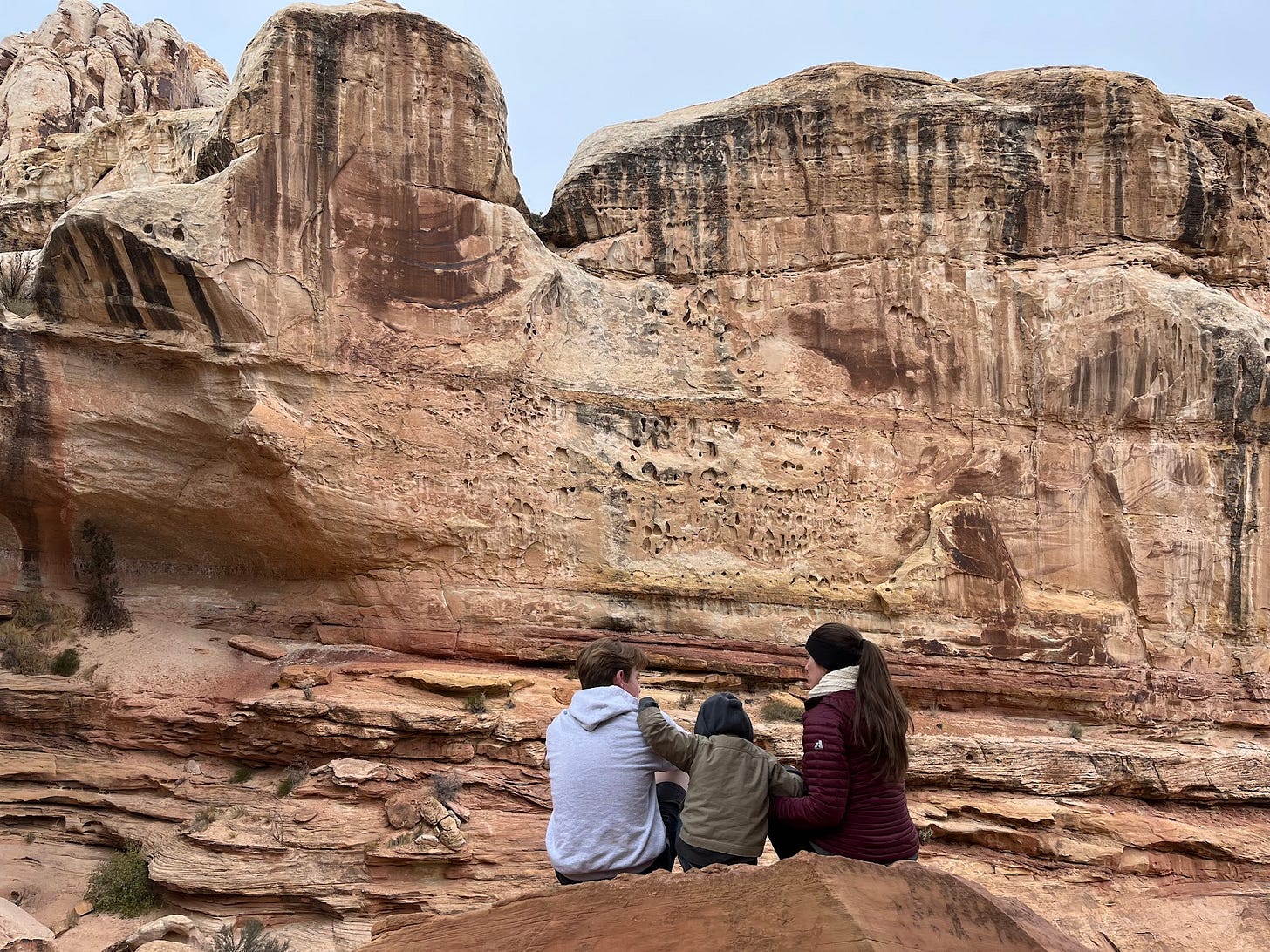Here we are: on the cusp of gathering after a divisive election, in a world increasingly defined by curated realities and deep divides.
We’re taking a break from a world where we (or the algorithm) choose self-affirming media, neighbors, workplaces/coworkers, and partners, and enter in with a rare group we cannot choose: our extended family. We’re leaving an online world where we tend to piece together identities of these extended family members through the way they curate their online image. This week we are thrust into the flesh-blood-and-bone dimension, seeing people in their fulness. This upcoming Thanksgiving feels consequential.
What will we choose to do? Will we avoid certain family members or the gatherings all together? Or will we move toward family members who disagree with us? Will we leave the holiday feeling more hostile or more healed?
As I (Andrew) write this, I am at an Airbnb with my parents, all nine of my siblings, their spouses and children. We run across the spectrum on just about everything: from the liberal to the conservative, from the God-fearing to the atheist, from the rural to the urban, from the home-schooled to the public-schooled and more. One would think this is the setup for either a bad joke, reality TV show, or a recipe for a familial civil war. And yet . . . we are having the best time! Hiking in Capitol Reef National Park, playing board games, cooking together, celebrating the announcement of a new baby, renting a small local theater to watch “Pirates of Penzance,” and rehearsing for a musical program we’ll be putting on tonight, among many other activities. It’s been nothing short of glorious. Why is this?
Beyond my own experience on this vacation, Jonah and I conducted interviews of both Trump and Harris supporters, and polled folks on social media about how to navigate this upcoming Thanksgiving. This all culminated into two ways in which we can enhance unity during Thanksgiving: 1) Generally Focus on Common Ground and 2) Intentionally Focus on Uncommon Ground.
Generally Focus on Common Ground.
In the end, my siblings are my siblings. These are the people I grew up with. These are the people who raised me and who I raised. I love each of them inexhaustibly and have been exulting in the time together in-person. There is a lot we can connect on without bringing up what can be sharp, painful differences.
It turns out that many agree with this approach. I asked some friends and family on Instagram the following question: How will you engage with family who disagree politically this Thanksgiving? 58 percent of the roughly 40 respondents selected, “Talk about other stuff we have in common.” When I asked on LinkedIn, I received a similar response. Relationship and leadership expert, Kathrin Peters commented:
“It's both a big challenge and a huge chance. A challenge because many are still hurting while others are triumphing, often projecting the resulting feelings on the respective other. This is tough, to say the least. But it's also a chance. Because in the end, the easiest fallback when faced with such division is to find the lowest common denominator and build back from there. What is it that we all share? What hopes, dreams, and goals do we have in common at the bottom of it all? With family, despite the intensity that can come with it, there's a baked-in common denominator. We are quite literally from the same stock! So, what do we all fall back on together? Humanity? Family culture and history? Shared stories and experiences? Similar hopes and goals for ourselves and our children? Our need to feel safe, loved, and belonging? It is from there that we can rebuild bridges. Making that the center of our interactions and conversations will remind us that in the face of disagreement and opposition, we still have a lot more that unites than divides us. That is the hope I see, and what better day to do that than on Thanksgiving!”
Some other comments from interviews Jonah and I conducted across the political aisle echo this approach.
“Remember, the purpose of the gathering is to give thanks together.”
“Let your love for each other be your common ground, regardless of what you believe. You don’t know how long you have together, so just be grateful.”
“Separating and cutting off is not the way forward. Most people will navigate this holiday successfully by not dwelling on the most divisive topics.”
“Keep politics off the table. Let’s not bring this up because it’s really touchy and very sensitive for a lot of people.”
“We’re going to see Moana 2!”
When in doubt, settle into the abundance you have in common!
Intentionally Focus on Uncommon Ground.
I had a startling experience yesterday when I discovered that a family member voted differently than I did. I know and love this person so much that I was quickly faced with an inner choice: feel betrayed or feel curious. With some effort–and some mistakes–I ultimately chose curiosity. The two conversations we had ultimately offered me hope, not just for our relationship but for the possibility of building bridges across political divides.
What follows are a few principles I took from this experience as well as from other interviews and comments on this topic (including the 38 percent on Instagram who proposed “getting curious to understand” as their preferred approach this Thanksgiving).
Consider the strength of the relationship. Can it withstand disagreement? How much love do you have for each other? Can that love permeate before, during and after a conversation where you disagree? One cousin talked about how avoiding the disagreement would not work given the closeness he felt to certain family members and how he valued the relationship too much to leave these differences brushed under the rug.
Find one-on-one time. Avoid large group conversations where opinions will vary widely and you do not have any trained facilitator to guide the conversation. This would likely be the equivalent of a Thanksgiving foodfight, with all the good stuff you could have gained from engaging effectively left as a very unsatisfying mess to clean up.
Use the language of curiosity. Reference this post and prompts for ideas.
Experiment with their perspective. One LinkedIn friend suggested finding a couple of positions on the other side of the political spectrum where you agree, even if they are small. “Doing that has always helped me remember that my ‘side’ isn’t perfect and sets me up to be a better listener.”
Set ground rules. If politics or another divisive subject does come up, consider setting certain ground rules together before the conversation begins. In one of my interviews, a cousin and I brainstormed the following:
On my current vacation, I’ve tried these principles on both of the taboo topics of politics and religion with siblings who disagree with me. I can say with certainty that it has only strengthened my relationship with them.
What if you’re not ready for any engagement?
There were those we interviewed and on social media (9 percent) who are not ready to engage with those who disagreed or avoid the gathering all together. It’s essential to recognize your readiness, and if you find yourself in a position where you really cannot move through the differences together, you may be better off creating space at this point for yourself to process and center. Our invitation would be to set a goal of curiosity and love rather than walling things off forever.
Our Invitation
In the end, we hope that everyone can live the words of the poem etched on my in-law’s wooden awning above their home (and which they practice powerfully with their many gatherings).
Love,
Andrew and Ariel









